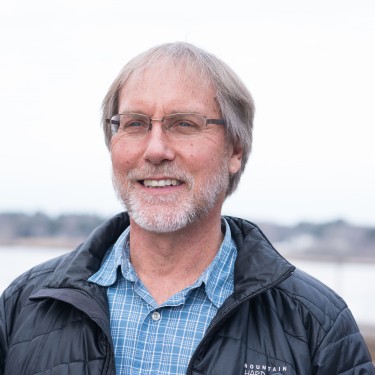
Thomas Klak, Ph.D.
Location
Gene Conservation Chair, Maine Chapter of the American Chestnut Foundation
Science & Technology Committee member, American Chestnut Foundation
Credentials
Education
Expertise
- Eco-resilience
- Ecology
- Genetic engineering
- Genomics
Research
Current research
American chestnut restoration project in the news
Selected publications
If you'd like a copy of any of these publications, please email me: tklak@une.edu
Student co-authors are in italics.
2021. Thomas Klak, Ellen Spiers, and William Powell. 2021. “Breakthrough: Transgenic Pollen in Less Than a Year” Chestnut: The Journal of The American Chestnut Foundation Vol. 35, No. 3 (Fall), pp.27-29.
2021. Thomas Klak and Vernon Coffey, “Is Controlled Pollination Really Controlled?” in Chestnut: The Journal of the American Chestnut Foundation, Vol. 35, No. 2, pp. 31-33.
2020. Thomas Klak, Woon Yuen Koh, Tyler Riendeau, and Andrew Grammas, “Comparison of Four Methods for Non-Destructive Testing of Chestnut Seeds for Oxo Gene Activity” in Chestnut: The Journal of the American Chestnut Foundation, Vol. 34, No. 3, pp. 31-34.
2018a Klak, Thomas “Planting Pure American Chestnuts on Wild and Remote Long Island, Maine” Chestnut: The Journal of the American Chestnut Foundation Spring, 32(1)12-14 https://www.acf.org/wp-content/uploads/2019/01/WEB-Chestnut_Winter2018.pdf?x27388&x27388
2018b Klak, Thomas “Preserving and Making Accessible American Chestnut Biodiversity in Maine” Chestnut: The Journal of the American Chestnut Foundation Winter, 32(2)10-12
2018c Klak, Thomas “TACF-Landowner Partnerships: An Unfolding Story from Maine” Chestnut: The Journal of the American Chestnut Foundation Fall, 32(3)10-12
2017. Collins Tracey, Chris Indorf, and Thomas Klak, “Creating regional consensus for starting school later: A physician-driven approach in Southern Maine”, Sleep Health: Journal of the National Sleep Foundation, Vol. 3, pp.479–482 https://doi.org/10.1016/j.sleh.2017.10.002
2017. Noah Perlut, Thomas Klak, and Eldar Rakhimberdiev “Geolocator data reveal the migration route and wintering location of a Caribbean Martin” The Wilson Journal of Ornithology. Vol 129, No. 3, pp. 605–610.
2016. Thomas Klak and Joseph Simonowicz, “Relationships between World Heritage Sites and their Contiguous Communities: Cross-Scale Analysis and Dominica Case Study,” chapter in: Global Change and the Caribbean: Adaptation and Resilience. Barker, D., D. McGregor, T. Edwards and K. Rhiney (editors). Kingston, Jamaica: University of the West Indies Press.
2016. Edward L. Jackiewicz and Thomas Klak “Mass and Alternative Tourisms in Latin American and the Caribbean” in Placing Latin America: Contemporary Themes in Geography. (Third Edition) Ed Jackiewicz and Fernando Bosco (editors). Lanham, Maryland: Rowman & Littlefield.
2016. Thomas Klak, “Economic and Geopolitical Vulnerabilities and Opportunities” in Placing Latin America: Contemporary Themes in Geography. (Third Edition) Ed Jackiewicz and Fernando Bosco (editors). Lanham, Maryland: Rowman & Littlefield.
2014. Thomas Klak, “World Systems Theory: Core, Semi-Peripheral, and Peripheral Regions,” chapter in: The Companion to Development Studies. (Third Edition) Edited by Vandana Desai and Robert Potter. NY: Routledge, pp. 121-127.
2014. Thomas Klak. “The Importance of Intercultural Engagement in Study Abroad: Experiences in Dominica” International Agenda http://www.schoolcraft.edu/department-areas/international-institute/international-agenda Vol 13, No. 2, pp. 14-17 & 23.
2013. Thomas Klak and Emma Gaalaas Mullaney. “Levels and Networks in Community Partnerships: A Framework Informed by our Overseas Partners” Gateways: International Journal of Community Research and Engagement, Vol 6, pp.1–21.
2013. Thomas Klak, “World Systems Theory: Core, Semi-Peripheral, and Peripheral Regions,” in: The Companion to Development Studies. (Third Edition) Edited by Vandana Desai and Robert Potter. London: Edward Arnold Publishers.
2012. Erika D. Nelson and Thomas Klak, "Equity in International Experiential Learning: Assessing Benefits to Students and Host Communities". PRISM: A Journal of Regional Engagement. 1, 2, pp.106-129.
2012. Thomas Klak, “Synergy between Geographical Scholarship and Study Abroad Teaching: Dominica’s Farming Communities” Focus on Geography Vol. 55, No. 4 (Winter) pp. 125-131.
2011. Thomas Klak, James Wiley, Emma Gaalaas Mullaney, Swetha Peteru, Seann Regan, Jean-Yves Merilus, “Inclusive Neoliberalism?: Perspectives from Eastern Caribbean farmers” Progress in Development Studies. Vol. 11, No. 1 pp. 33–61.
2011. Thomas Klak and Emma Gaalaas Mullaney. “International Civic Engagement: From Development Studies and Service-Learning, to Miami University-Dominica Partnerships”, Partnerships: A Journal of Service Learning & Civic Engagement. Vol. 2, No. 1 (Winter) pp. 1-26.
2010. Swetha Peteru, Seann Regan, and Thomas Klak, “Local Vibrancy in a Globalizing World: Evidence from Dominica, Eastern Caribbean” Focus on Geography Vol. 53, No. 4 (Winter) pp. 124-133.
Other scholarly activity
2019 Maine Paid Summer Research:
The American Chestnut Foundation
Locations: Biddeford & Saco area, and various other towns around Maine (Hartland, Manchester, Stetson, Veazie, Bradley, Hope, Camden, Monmouth, China, Unity, Searsport, Winthrop, Vienna, Phippsburg).
Tasks and Responsibilities: Assist with testing seedlings for pathogen resistance via inoculations and ratings. Participate in field performance and phenology measurements of seedlings. Assist with organizing and planting Germplasm Conservation Orchards. Work cooperatively on tasks with other students doing TACF summer research. Assist with tree breeding and seed orchards at several Maine locations (fertilizing, weeding, irrigating, inventory, fencing, planting). Assist with testing orchard trees for pathogen resistance via in-situ field inoculations and ratings. Participate in discovery teams searching by ground and air for large surviving American chestnut trees around Maine. Data entry, website maintenance, and chapter membership communications.
Compensation: $12/hour, 20 hours/week for 12 weeks (may be full-time contingent on pending grant); some travel and meals may be compensated. You will need to provide your own transportation and task-appropriate clothing and safety equipment (boots, gloves etc.).
Optional for-credit Internship: If student desires, arrangement can be made to earn UNE credit for an internship or directed study.
Supervision: Work performed independently under the supervision of UNE Professor Thomas Klak and other Maine TACF board of directors.
Dates: Flexible – May through August
Application deadline is open until position is filled: Send a cover letter explain how position contributes to your academic and career goals, and resume, to these TACF Maine Chapter board members: Tom Klak tklak@une.edu ; Glen Rea: glenrea42@msn.com
For more information please contact Tom Klak, Dept of Environmental Studies, UNE tklak@une.edu or visit TACF Maine Chapter website: http://www.me-acf.org/ .